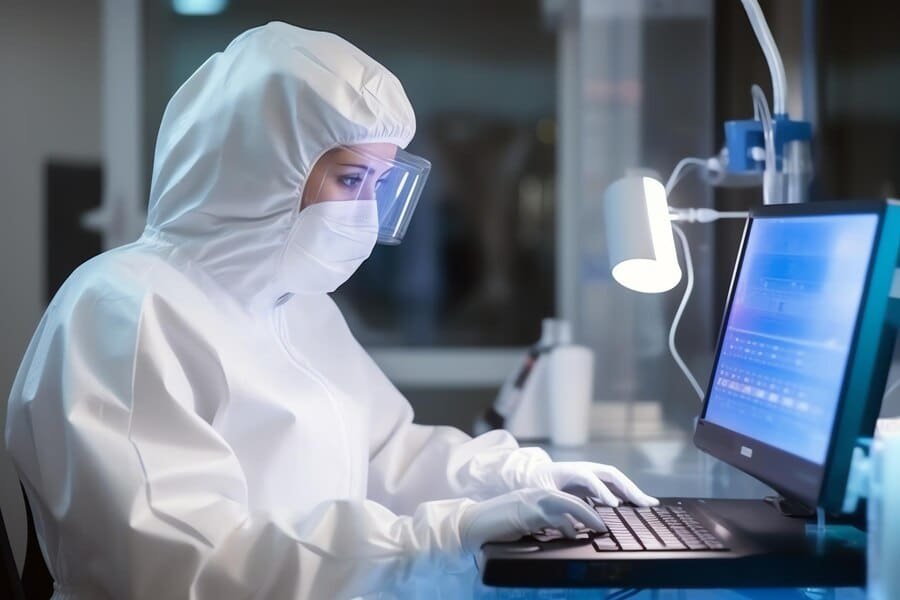Trends In Medical Technology: The world of medicine is constantly evolving, with breakthroughs and innovations happening at an unprecedented pace. Medical technology plays a vital role in enhancing patient care, improving diagnosis, and revolutionizing treatment options. In this article, we will delve into the most recent trends in medical technology, showcasing how these advancements are reshaping the healthcare landscape.
Telemedicine: Bridging the Gap
Telemedicine has gained immense popularity over the last few years, but its significance skyrocketed during the COVID-19 pandemic. This technology allows patients to receive medical consultations remotely, reducing the need for in-person visits. With the integration of high-quality video conferencing, secure data transmission, and remote monitoring devices, telemedicine has become a game-changer in providing healthcare access to people in remote areas and those with limited mobility.
Artificial Intelligence in Healthcare
Artificial intelligence (AI) is transforming healthcare in multiple ways. Machine learning algorithms can analyze vast amounts of medical data, making diagnoses more accurate and efficient. AI-powered chatbots and virtual assistants are being used for patient engagement and providing health-related information. Moreover, robots equipped with AI are assisting in surgeries, improving precision and reducing the risk of human error.
Wearable Health Technology
Wearable devices, such as fitness trackers and smartwatches, are no longer limited to counting steps and monitoring heart rate. They have evolved into comprehensive health monitoring tools that can track vital signs, detect irregularities, and even predict potential health issues. These devices are becoming more sophisticated, providing valuable data to both patients and healthcare professionals for early intervention and personalized healthcare.
3D Printing in Medicine
The advent of 3D printing technology has revolutionized healthcare in various ways. Surgeons can now create patient-specific models of organs or body parts before performing complex procedures, allowing for precise planning and reducing surgical risks. Customized prosthetics, implants, and even medications can be 3D-printed to fit individual patient needs, improving outcomes and quality of life.
Genomic Medicine Latest Trends In Medical Technology
Genomic medicine involves analyzing an individual’s genetic makeup to tailor medical treatments and interventions. Recent advancements in gene sequencing technologies have made it more affordable and accessible. This has led to breakthroughs in cancer treatment, rare disease diagnosis, and pharmacogenomics, where medications can be prescribed based on a patient’s genetic profile to maximize efficacy and minimize side effects.
Virtual Reality (VR) in Healthcare
Virtual reality is not just for gaming; it has found its way into healthcare as well. VR is being used for pain management, therapy, and even surgical training. Patients can immerse themselves in calming environments during medical procedures, reducing anxiety and discomfort. Healthcare professionals can also practice complex surgeries in a virtual environment, enhancing their skills without risk to real patients.
Nanomedicine
Nanotechnology has opened up new possibilities in drug delivery, imaging, and diagnostics. Nanoparticles can be engineered to target specific cells or tissues, increasing the precision of treatments while minimizing side effects. Additionally, nanoscale imaging techniques allow for earlier and more accurate disease detection, leading to improved outcomes and early intervention.
Robotics in Healthcare
Robotics has come a long way in healthcare, and its applications are continually expanding. Surgical robots, such as the da Vinci Surgical System, enable minimally invasive procedures with greater precision and smaller incisions. Robotic exoskeletons assist patients with mobility issues, while robotic caregivers can provide support and companionship to the elderly and disabled.
Blockchain for Healthcare Data
The security and privacy of healthcare data are paramount. Blockchain technology offers a secure and transparent way to store and share patient information. Patients have more control over their data, allowing them to share it securely with healthcare providers when needed. Additionally, blockchain can help streamline administrative processes, reduce fraud, and improve the overall efficiency of healthcare systems.
Bioelectronic Medicine
Bioelectronic medicine involves using electronic devices to modulate the body’s electrical signals and neural pathways. This technology is promising for treating conditions like chronic pain, inflammatory diseases, and neurological disorders. By precisely controlling nerve impulses, bioelectronic devices can offer drug-free and targeted relief to patients.
Augmented Reality (AR) for Medical Training
Augmented reality is enhancing medical training and education. Medical students can use AR applications to visualize and interact with complex anatomical structures, improving their understanding and retention of information. Surgeons can also benefit from AR overlays during procedures, providing real-time guidance and enhancing their decision-making capabilities.
Personalized Medicine
One size does not fit all in healthcare, and personalized medicine is gaining traction. Through advanced diagnostics and genetic profiling, treatments can be tailored to an individual’s unique characteristics and needs. This approach maximizes treatment efficacy and minimizes adverse effects, leading to better patient outcomes.
CRISPR and Gene Editing
CRISPR-Cas9 technology has revolutionized gene editing and holds immense potential for treating genetic diseases. Scientists can modify specific genes to correct mutations and restore normal function. While ethical and safety concerns remain, ongoing research and advancements in gene editing techniques are paving the way for potential cures for previously untreatable conditions.
Remote Monitoring and IoT
The Internet of Things (IoT) is being utilized in healthcare for remote monitoring of patients with chronic conditions. Devices such as smart inhalers, glucose monitors, and cardiac implants can transmit real-time data to healthcare providers, enabling early intervention and reducing hospitalization rates. This trend is especially beneficial for managing elderly and high-risk patients.
Quantum Computing for Drug Discovery
Quantum computing is on the horizon for drug discovery and development. Its immense computational power can simulate complex biological systems, accelerating drug discovery processes and leading to the development of more effective treatments for diseases such as cancer and Alzheimer’s.
Robotic-Assisted Rehabilitation
Robotics is also making a significant impact on rehabilitation. Devices like exoskeletons and robotic arms aid patients in regaining mobility and strength after injuries or surgeries. These technologies facilitate intensive and targeted rehabilitation, helping patients recover more quickly and effectively.
Targeted Therapies
Advancements in targeted therapies are changing the landscape of cancer treatment. Drugs and immunotherapies are being developed to target specific molecules and genetic markers associated with cancer cells, minimizing damage to healthy tissue and improving patient outcomes.
AI-Enhanced Diagnostics
Artificial intelligence is making diagnostics faster and more accurate. AI algorithms can analyze medical images, such as X-rays and MRIs, with exceptional precision, aiding in the early detection of diseases like cancer and providing quicker results to healthcare providers.
5G in Healthcare
The rollout of 5G technology is transforming healthcare by enabling faster data transmission and real-time communication. This is crucial for remote surgeries, telemedicine consultations, and the integration of IoT devices for patient monitoring.
Biohacking and DIY Health
The rise of biohacking and do-it-yourself (DIY) health solutions is allowing individuals to take control of their health. From tracking personal health metrics to experimenting with nootropics and wearable devices, people are exploring new ways to optimize their well-being and longevity.
Conclusion
The world of medical technology is a dynamic and ever-evolving field. The trends discussed in this article represent just a fraction of the innovations shaping the future of healthcare. As technology continues to advance, we can expect even more exciting developments that will enhance patient care, improve diagnosis and treatment options, and ultimately lead to a healthier and more connected world.
FAQs
1.What is telemedicine, and how does it work?
Telemedicine is a healthcare practice that allows patients to receive medical consultations and treatment remotely, typically through video conferencing or other digital communication tools. It enables patients to connect with healthcare providers without the need for in-person visits, making healthcare more accessible, especially in remote areas.
2.How is artificial intelligence (AI) being used in healthcare?
AI is being used in healthcare to improve diagnosis, treatment, and overall patient care. AI-powered algorithms can analyze large datasets of medical information, assist in making more accurate diagnoses, personalize treatment plans, and even automate administrative tasks in healthcare settings.
3.What are wearable health technologies, and what can they monitor?
Wearable health technologies refer to devices like smartwatches and fitness trackers that individuals can wear to monitor various aspects of their health. These devices can track vital signs such as heart rate, sleep patterns, physical activity, and in some cases, even detect irregularities in health metrics.
4.How does 3D printing benefit healthcare?
3D printing technology has numerous applications in healthcare, such as creating patient-specific models for surgical planning, producing customized prosthetics and implants, and even developing pharmaceuticals. It enhances precision, reduces surgical risks, and improves the overall quality of care.
5.What is personalized medicine, and how does it differ from traditional medicine?
Personalized medicine tailors medical treatments and interventions to an individual’s unique genetic, environmental, and lifestyle characteristics. This approach maximizes treatment efficacy and minimizes adverse effects by considering the specific needs and responses of each patient. Traditional medicine, on the other hand, often relies on a one-size-fits-all approach.
Source Image : Freepik.com





